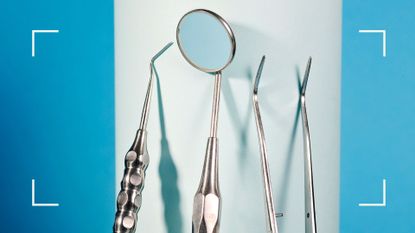How often should you go to the dentist? Dentists reveal it's actually less than you think
How often should you go to the dentist? Here, two dentists reveal how many times a year you should get a check-up


How often should you go to the dentist? With the outbreak of the Covid-19 pandemic, many of us haven't booked an appointment to see the dentist in a few years now. While a check-up is still essential for maintaining good oral hygiene, the good news is that you may not need to go as often as you think.
Many of us believe, whether we actually make an appointment or not, that going to the dentist every six months is the best way to keep our teeth healthy. But there's actually little evidence that this time scale makes any difference to the risk of developing the nasty conditions we're trying to avoid, like gum disease or tooth decay.
If you're looking to learn how to whiten teeth naturally or want cosmetic dental work then you'll definitely have to go to the dentist more often. But here, two leading dentists reveal how regularly you should really be going to the dentist and to the hygienist if you just want to maintain a healthy smile.
How often should you go to the dentist?
If your mouth is generally healthy and you know how to brush your teeth properly, then you should be fine with an annual check-up, says Dr Manrina Rhode, a leading cosmetic dentist. "However, if you have issues, like recurrent decay, then these visits should be more frequent, six-monthly check-ups."
Many people will be just fine with a dental appointment once a year though, she adds. "The reason for annual checks is if your mouth is healthy then an annual check will catch any small problems or cavities before they become big ones."
If you're wondering how often should you go to the dentist and you want to keep your bookings to a minimum, keep your mouth, teeth, and gums healthy year-round by knowing how often you should change your toothbrush, brushing your teeth, and flossing regularly to help remove harmful plaque build-up, which can lead to cavities and gum disease.

How often should you go to the hygienist?
When it comes to the hygienist, it's all about your personal needs and how much you care about that bright white smile. If you're totally healthy, dentist Faizan Zaheer recommends visiting the hygienist once a year or sometimes even once every two years. "Regular visits to a hygienist will ensure that hidden and difficult-to-reach plaque and tartar are removed from your teeth, eliminating rough surfaces which contribute to the build-up of bacterial numbers, and improving the health of your teeth and gums," he explains.
Sign up for the woman&home newsletter
Sign up to our free daily email for the latest royal and entertainment news, interesting opinion, expert advice on styling and beauty trends, and no-nonsense guides to the health and wellness questions you want answered.
If you want a whiter smile and have tried everything from the best whitening toothpaste to those little whitening strips, then it's also best to just book a hygienist appointment. There are a couple of ways to prevent yellow teeth but a hygienist appointment is your best bet for maintaining brighter teeth in the long term, Zaheer says. "We have techniques like scaling and polishing, as well as AIR-FLOW therapy," he explains, "This is an advanced method using a wand to deep clean and polish your teeth with a combination of water, compressed air, and fine powder particles."
However, there are certain times when you'll need a hygienist appointment more regularly. "Your dentist may also recommend seeing a hygienist for a thorough clean before beginning complex treatment, such as dental implants. Some people with a high risk of periodontal disease may need to visit the hygienist every three months whereas lower-risk individuals may only need to visit once a year or even once every two years," he says.

What happens if you don't go to the dentist
If you don't go to the dentist at all, then you are significantly more at risk of developing serious adverse health conditions - and not just those affecting your teeth. All the experts agree that those who never go to the dentist and the hygienist, or hardly at all, are more at risk of developing:
- Plaque build-up
- Tooth decay
- Gum disease
- Cavities
- Bad breath
- Abscesses
As the mouth is the first point of call for bacteria, skipping the dentist also puts you at risk of other concerning conditions like cardiovascular disease, diabetes, and even adverse pregnancy outcomes, according to research by the University of Dammam College of Dentistry. This is because you're more likely to miss out on treatment for periodontal disease, which affects up to half of the worldwide population, and is caused by infections and inflammation of the gums and surrounding bone in your mouth.
There's no need to go more than one a year though, unless your dentist or hygienist recommends it. The six-monthly check-up isn't only isn't only contested by the dentists we spoke to, there's little evidence to support the idea that going to the dentist this regularly lessens your risk of tooth decay or missing teeth, or increases the risk of needing a filling, a review by the University of Birmingham found. They also discovered that there was no difference in the amount of bleeding, plaque, or gingivitis on the teeth of those who had regular appointments versus though who didn't.

Grace Walsh is woman&home's Health Channel Editor, working across the areas of fitness, nutrition, sleep, mental health, relationships, and sex. She is also a qualified fitness instructor. In 2024, she will be taking on her second marathon in Rome, cycling from Manchester to London (350km) for charity, and qualifying as a certified personal trainer and nutrition coach.
A digital journalist with over six years experience as a writer and editor for UK publications, Grace has covered (almost) everything in the world of health and wellbeing with bylines in Cosmopolitan, Red, The i Paper, GoodtoKnow, and more.
-
 'Shall we go and cause a little mischief?' - Hannah Waddingham and Prince William discuss the Earthshot Prize over a pint and game of darts
'Shall we go and cause a little mischief?' - Hannah Waddingham and Prince William discuss the Earthshot Prize over a pint and game of dartsThe pair both appear in a new documentary premiering tonight on BBC One
By Charlie Elizabeth Culverhouse Published
-
 How to clean log burner glass – 4 natural methods for the clearest view of flickering flames
How to clean log burner glass – 4 natural methods for the clearest view of flickering flamesIs black soot on the glass of your log burner ruining the way it looks? Our expert guide is here to get it gleaming
By Natasha Brinsmead Published